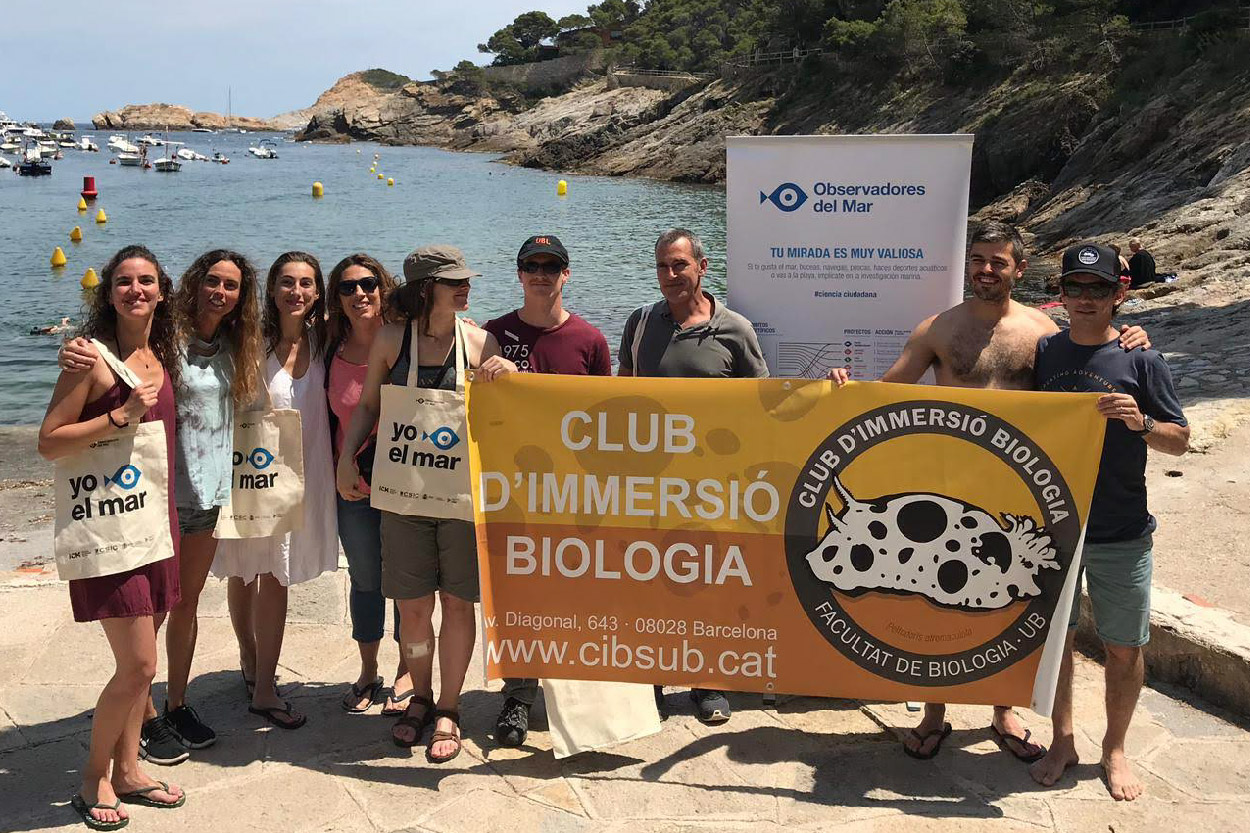Noticia

El Observatorio Centinela CIB sigue la evolución de desiertos submarinos en la Costa Brava.
Los desiertos submarinos son un problema emergente en nuestros ecosistemas marinos. La ciencia ciudadana es uno de los mecanismos para implicar a diferentes colectivos en el seguimiento de esta problemática.
09/04/2020
Muchos ecosistemas marinos se sustentan en bosques de algas que, al igual que los terrestres, generan entornos donde un gran número de especies encuentran un lugar seguro para vivir, refugiarse y reproducirse. Cuando la cobertura vegetal marina desaparece, estos ecosistemas se empobrecen, dejando superficies de roca desnuda con poca biodiversidad. Estos son los desiertos submarinos o blanquizales, un problema emergente en nuestros ecosistemas marinos.
Los desiertos submarinos pueden surgir por diferentes causas. Entre ellas, la sobrepesca de especies depredadoras, como el sargo, provocando un aumento en la abundancia de especies herbívoras como los erizos que, en ausencia de sus depredadores naturales, proliferan y merman los bosques de algas, dejando a la vista la roca pelada. El impacto de las olas de calor en el mar y la llegada de especies invasoras como los peces conejo, son otras de las causas que favorecen la aparición de desiertos submarinos.
Ante esta problemática en expansión en el Mediterráneo, el investigador Jordi Boada comenzó el proyecto Desiertos Submarinos en Observadores del Mar, con el objetivo de que la ciencia ciudadana sume esfuerzos en la identificación de blanquizales y la conservación de la vegetación submarina, esencial para el equilibrio de los ecosistemas. “Para encontrar soluciones, lo primero es localizar y hacer un seguimiento adecuado de los desiertos submarinos” explica el investigador. El proyecto cuenta con su propia web en inglés, Hidden Deserts, donde pronto se pondrá en marcha una campaña de microfinanciación.
A este reto se suma el Observatorio Centinela Club d'Immersió Biologia (CIB), que se propone la identificación y seguimiento de un blanquizal emergente en la Costa Brava. Tras una formación teórica y práctica, la primavera pasada llevaron a cabo una prospección de un posible blanquizal en la cala de Aiguafreda (Begur), guiados por Jordi Boada. En primer lugar, se utilizó un dron para determinar la extensión del blanquizal, y se escogió la zona más idónea para que los submarinistas realizaran los transectos, evaluando el porcentaje de cobertura algal y el número de erizos. Esta temporada, planean una prospección similar en un desierto submarino que puede estar surgiendo en la costa de Palamós. Tras analizar ambas zonas, decidirán junto al investigador cuál es la más idónea para realizar un seguimiento bianual (en primavera y otoño) de su evolución. Localizar y determinar la extensión de blanquizales y seguir su evolución en el tiempo es clave en la investigación de la problemática y la búsqueda de soluciones.
El CIB es el club de inmersión de la Facultad de Biología en la Universidad de Barcelona. Su principal objetivo es fomentar un buceo respetuoso con el medio ambiente, a través de acciones de formación y divulgación. Como Observatorio Centinela, han realizado censos de afectación y mortalidad de gorgonias en colaboración con el proyecto Atención Corales. Ahora, además del seguimiento de desiertos submarinos, se plantean realizar censos de los peces indicadores de cambio climático que indica el proyecto Peces Mediterráneos. El CIB desarrolla estas acciones con los socios del club, quienes se organizan y forman para colaborar con los proyectos de ciencia ciudadana marina.
